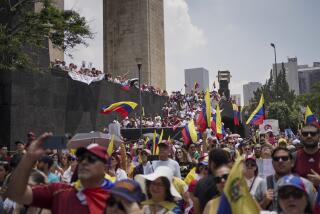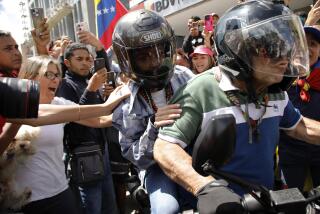Zimbabwe opposition agrees to join Mugabe’s government
- Share via
JOHANNESBURG, SOUTH AFRICA — Facing severe pressure from southern African leaders, Zimbabwe’s opposition voted Friday to join a unity government under President Robert Mugabe, despite failing to win its key demand for control of the police.
The opposition will share control of the police with Mugabe’s party, an arrangement that many in the opposition see as unworkable. Mugabe retains control of the military and intelligence services.
Opposition leader Morgan Tsvangirai won his party’s backing for the move at a meeting of its national council in Harare, the Zimbabwean capital, although some senior figures are unhappy about joining a government with Mugabe largely in control.
Tsvangirai believes the alternative, Mugabe forming his own government with the blessing of regional leaders, would be worse.
Tsvangirai’s Movement for Democratic Change, or MDC, faces isolation unless it complies with a recommendation Tuesday by regional leaders that the unity government be sworn in by mid-February.
At the same time, many analysts believe the unity government -- agreed to in September but bogged down until Friday in bitter wrangling over Cabinet positions -- has little hope of resolving the country’s entrenched crisis. They warned that Western aid, desperately needed to rebuild the impoverished country, is unlikely while Mugabe retains control of the military and security forces.
Western diplomats said that aid hinges on evidence of genuine political and economic reform and that Mugabe’s history of reneging on promises could prove problematic.
Tony Reeler, an analyst with the independent Research and Advocacy Unit in Harare, said in a phone interview that it would be difficult for the MDC to hold Mugabe’s ZANU-PF party accountable under the deal.
“What lies behind all of this is a political party that has no intention of sharing power and intends to treat the MDC as a junior partner,” Reeler said.
“All the indications going into this were that ZANU-PF showed no signs of being serious about this thing. The only thing they were serious about was holding on to power at all costs.”
He said the legislation that would define the powers of the president, the prime minister and other power-sharing bodies contained serious gaps and contradictions concerning Mugabe’s powers.
“If the parliament rubber-stamps it, there’s a disaster waiting to happen,” he said.
The opposition is expected to try to use its Cabinet majority to push out Reserve Bank Gov. Gideon Gono, blamed for the country’s hyperinflation, who recently was reappointed by Mugabe to a five-year term.
Zimbabwe ditched its currency Thursday, opening the way for all transactions in foreign money, as inflation spun further out of control.
The MDC’s decision came as Zimbabwe’s social crisis was worsening rapidly, according to U.N. agencies. The number of people in need of food aid is expected to reach 7 million in February, nearly two-thirds of the population of about 12 million people. The number sickened by cholera has reached 60,000, with more than 3,000 deaths, according to the World Health Organization.
The call for the unity government to be sworn in by mid-February, made by the regional leaders group known as the Southern African Development Community, offered few carrots to the opposition.
Political analyst John Makumbe of the University of Zimbabwe said the group had left the MDC little option but to accept the deal.
The group “has always supported Mugabe, and he could afford to be stubborn and resistant to democracy,” Makumbe said.
Only Western support can turn around Zimbabwe’s shattered economy, Makumbe said.
The Southern African Development Community “is not going to turn around the Zimbabwean economy. If the Western democracies are not happy about what the MDC has done, then the MDC may be wasting its time going into government, because nothing will change,” he said.
Despite the sparse progress in the recent talks, the opposition is in a stronger position than in the past, after coming out on top in the disputed parliamentary elections in March. At the time, Tsvangirai received more votes than Mugabe in the first round of the presidential race, but the opposition leader pulled out of the June runoff because of widespread violence. The second-round one-candidate vote was scorned by African observers.
Tsvangirai will be prime minister in the unity government and his party will control 13 of the 31 ministries, including finance, education and health, seen as crucial to addressing the cholera crisis and to reopening schools closed because teachers are not being paid.
A smaller opposition faction, known as the MDC-Mutambara, gets three ministries. It and the MDC control parliament. The MDC also has won control of all the urban councils and some rural ones.
In the wake of the deal, the opposition expects the release from prison of several dozen activists arrested in recent weeks, accused of fomenting an uprising. A joint committee to monitor the deal’s implementation, including keeping track of political violence, was set up Friday. It included several of Mugabe’s closest allies.
The opposition also plans to repeal a restrictive media law known as the Access to Information and Protection of Privacy Act that governs accreditation of journalists.
In a sign of the opposition’s growing confidence, Roy Bennett, a senior MDC member who went into exile three years ago, flew in to Harare on Friday for the vote. He fled to South Africa in 2006 when police were seeking him on allegations of a plot to overthrow Mugabe.
MDC spokesman Nelson Chamisa rejected reports of divisions in the party over the deal, saying the vote to join the government was unanimous.
“I can tell you there was wild cheering and ecstatic applause once the vote was taken. The deal will hold, because we have been working in the parliament,” he said. “I can assure you that we are going to achieve that objective.”
--
More to Read
Sign up for Essential California
The most important California stories and recommendations in your inbox every morning.
You may occasionally receive promotional content from the Los Angeles Times.










